外研版(2019)必修第一册Unit 1 A New Start课件(Using language Period 2-Vocabulary)课件
文档属性
| 名称 | 外研版(2019)必修第一册Unit 1 A New Start课件(Using language Period 2-Vocabulary)课件 | 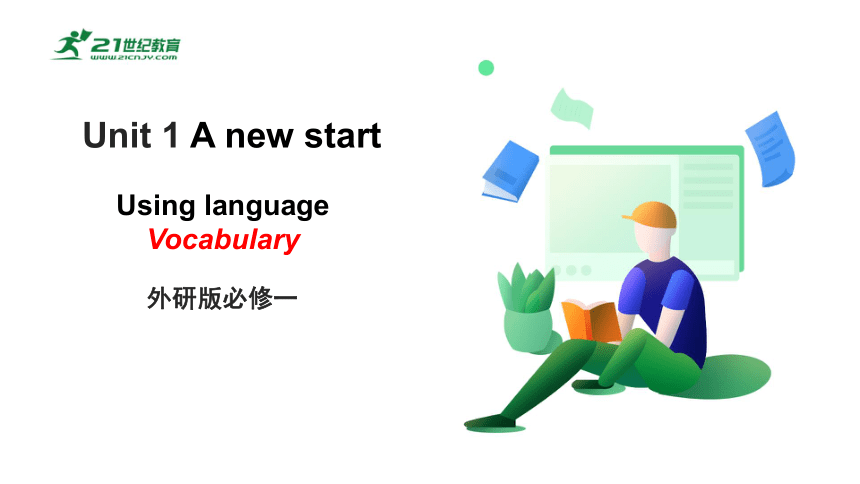 | |
| 格式 | pptx | ||
| 文件大小 | 8.5MB | ||
| 资源类型 | 试卷 | ||
| 版本资源 | 外研版(2019) | ||
| 科目 | 英语 | ||
| 更新时间 | 2022-08-31 16:40:58 | ||
图片预览

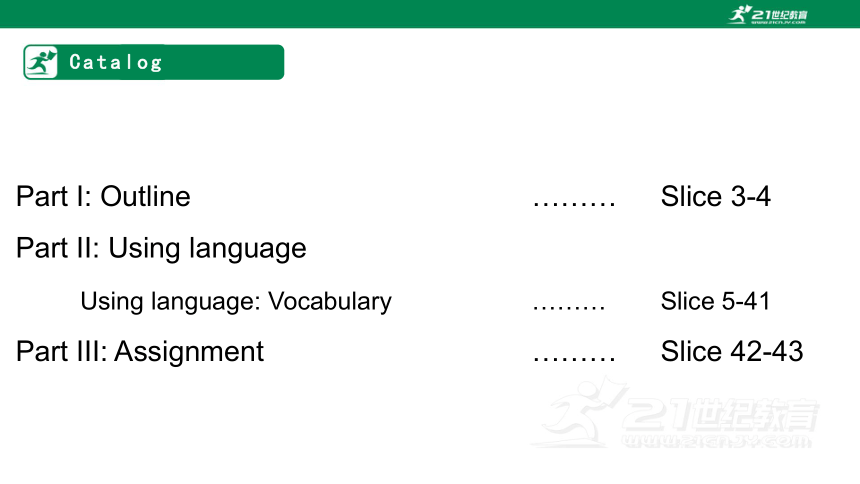
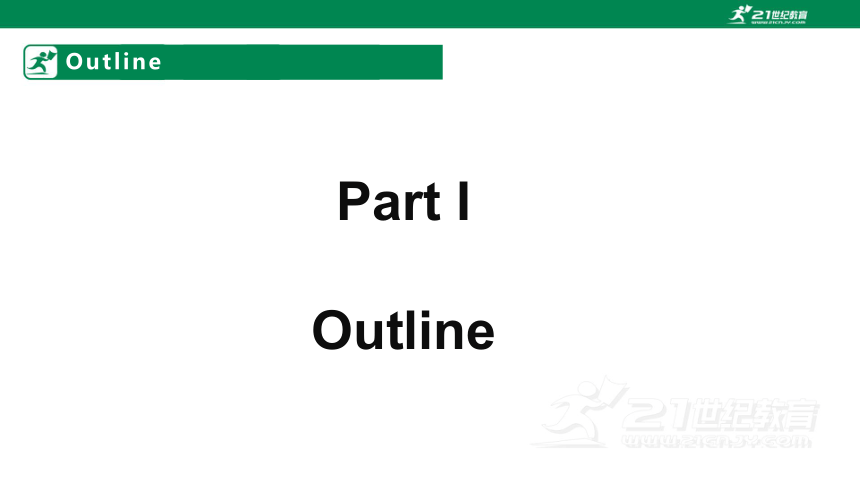
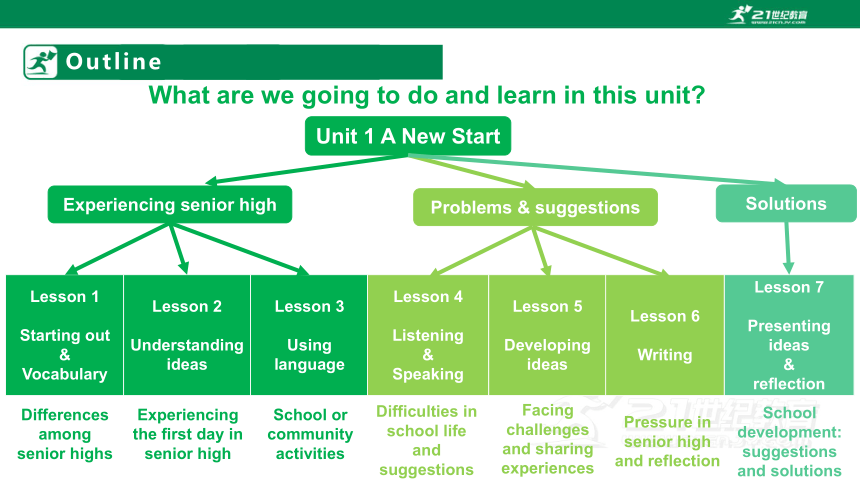
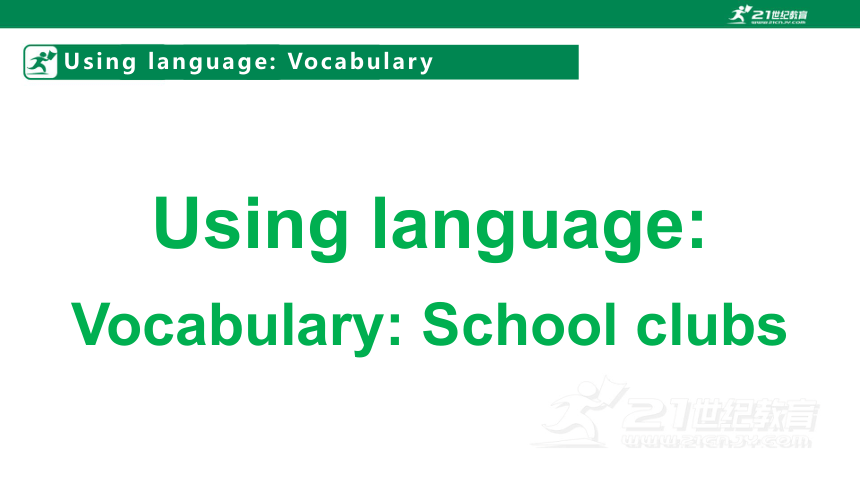
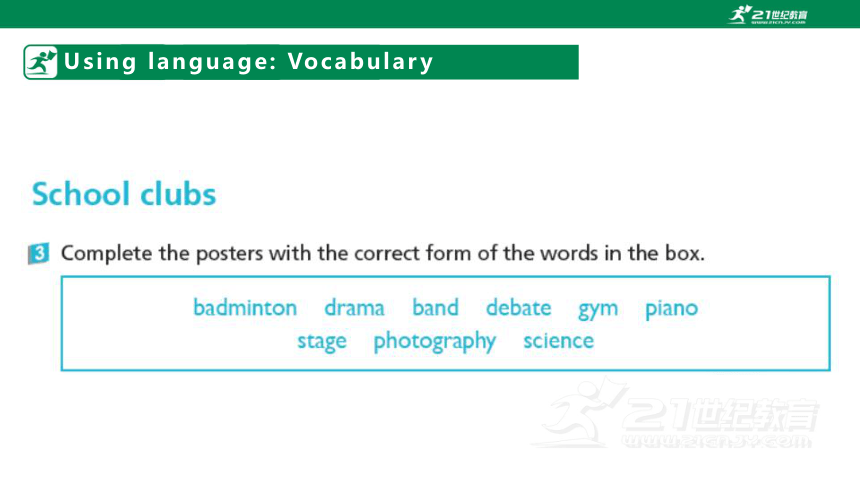
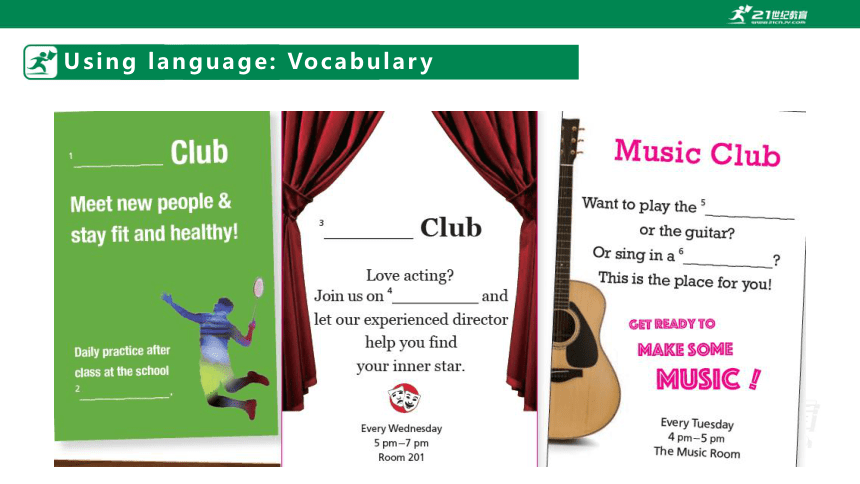
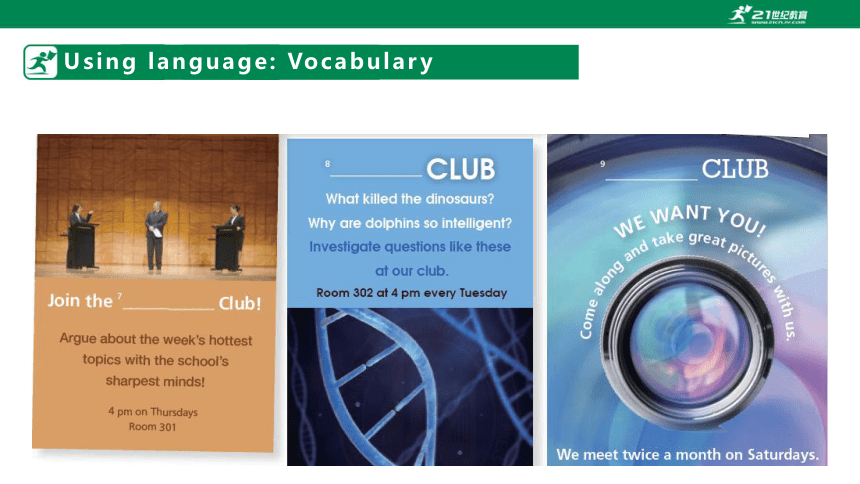
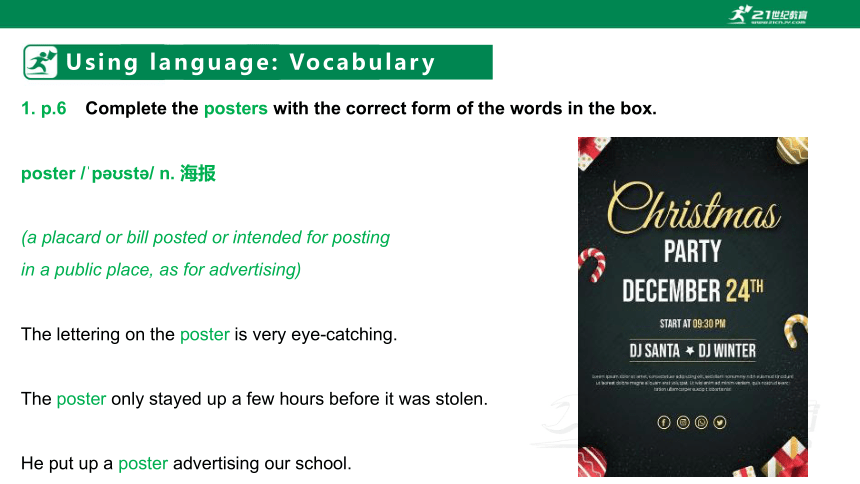
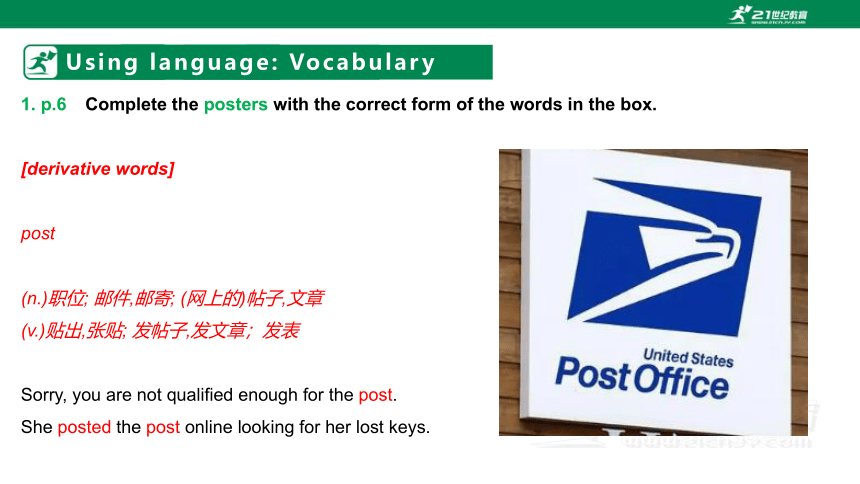
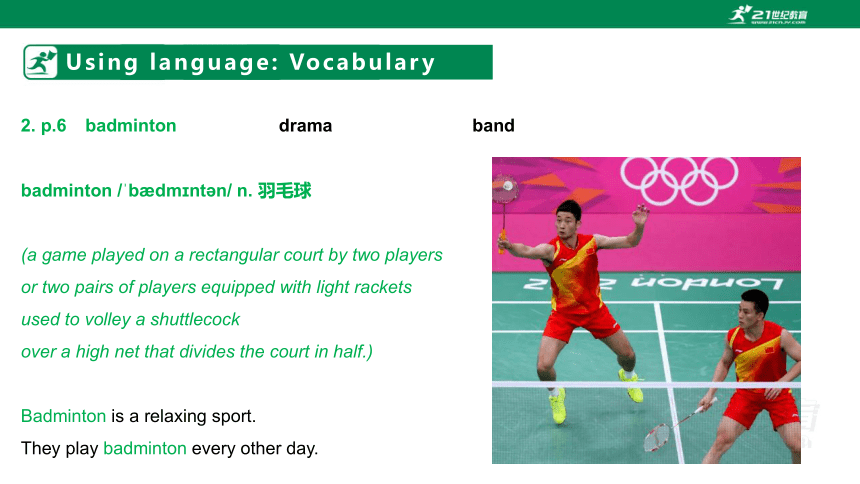

文档简介
(共45张PPT)
外研版必修一
Unit 1 A new start
Using language
Vocabulary
Catalog
Part I: Outline ……… Slice 3-4
Part II: Using language
Using language: Vocabulary ……… Slice 5-41
Part III: Assignment ……… Slice 42-43
Learning objectives
Outline
Part I
Outline
Outline
Lesson 1
Starting out
&
Vocabulary
Differences
among senior highs
Lesson 2
Understanding
ideas
Experiencing
the first day in senior high
Lesson 3
Using
language
School or community activities
Lesson 4
Listening
&
Speaking
Difficulties in school life and suggestions
Lesson 5
Developing
ideas
Facing challenges and sharing experiences
Pressure in senior high and reflection
Lesson 6
Writing
Lesson 7
Presenting
ideas
&
reflection
School development: suggestions and solutions
Unit 1 A New Start
What are we going to do and learn in this unit
Experiencing senior high
Problems & suggestions
Solutions
Using language: Vocabulary
Using language:
Vocabulary: School clubs
Using language: Vocabulary
Using language: Vocabulary
Using language: Vocabulary
Learning objectives
Using language: Vocabulary
1. p.6 Complete the posters with the correct form of the words in the box.
poster / p st / n. 海报
(a placard or bill posted or intended for posting
in a public place, as for advertising)
The lettering on the poster is very eye-catching.
The poster only stayed up a few hours before it was stolen.
He put up a poster advertising our school.
Learning objectives
Using language: Vocabulary
1. p.6 Complete the posters with the correct form of the words in the box.
[derivative words]
post
(n.)职位; 邮件,邮寄; (网上的)帖子,文章
(v.)贴出,张贴; 发帖子,发文章;发表
Sorry, you are not qualified enough for the post.
She posted the post online looking for her lost keys.
Learning objectives
Using language: Vocabulary
2. p.6 badminton drama band
badminton / b dm nt n/ n. 羽毛球
(a game played on a rectangular court by two players
or two pairs of players equipped with light rackets
used to volley a shuttlecock
over a high net that divides the court in half.)
Badminton is a relaxing sport.
They play badminton every other day.
Learning objectives
Using language: Vocabulary
2. p.6 badminton drama band
Extra:
英国波弗特公爵(the Duke of Beaufort)在格洛斯特郡(Gloucestershire)有个庄园叫Badminton。
据说羽毛球运动在1873年发源于此,故英语称badminton。
badminton指的是羽毛球运动
而在羽毛球运动中被来回击打的那个球,
在英语中被称作”shuttlecock”
shuttle的意思就是“来回,往返”(如机场大巴shuttle bus)
而羽毛球拍和网球拍一样都被称作racket
badminton:['b dm nt( )n] n.羽毛球运动
shuttlecock:[' t( )lk k] n.羽毛球,毽子
racket: ['r k t] n.(网球或羽毛球)球拍
Learning objectives
Using language: Vocabulary
3. p.6 badminton drama band
drama / drɑ m / n. 戏剧
(a composition in prose or verse presenting in dialogue
or pantomime a story involving conflict or contrast of character,
especially one intended to be acted on the stage; a play.)
The greatest drama comes from real life.
The Elizabethan period was the golden age of English drama.
Learning objectives
Using language: Vocabulary
4. p.6 badminton drama band
band /b nd/ n. 乐队,乐团
(a group of instrumentalists playing music of a specialized type)
The band is good at playing light music.
They are a teenager band made up of four cool boys.
[derivative words]
band: (n.)带,带状物, 条纹, 条饰; 一组人
(v.)捆绑,联合
A band of soldiers took up the city.
We band ourselves closely against Class 2 in the basketball match.
Learning objectives
Using language: Vocabulary
Extra: 一词二多
相信大家在初中的学习过程中就深有体会:英文中的一词多义和一词多性让很多学生很是头疼
任何语言的发展都是从具体到抽象,从一个意思/词性发展到多个意思/词性
所以大家课后可以阅读一些“词源学”相关文章从而真正理解而非死记硬背“一词二多”现象
我们通过”band”举例
为何名词是”乐队/团”,”一伙人”,
”带状物”等意思
而动词是”捆绑”,”联合” 等意思
你会发现本质上都是“归在一起的感觉”
Learning objectives
Using language: Vocabulary
词源学(etymology)小知识
band最常见的含义是“带、条”
因为band一词最早来自原始日耳曼语bindan,表示“布条”
古日耳曼人作战时常常会在胳臂上绑上一块布条区分敌我
所以band本义就是用来表示绑有相同布条的一群人
即同属于一个集体的人,如一个乐队的所有成员
“布条”需要先绑在胳膊上,所以动词为“捆, 绑”
另外,单词banner(横幅、旗帜)也与band同源
本意就是“用布做成的标识”
只是尺寸比band大一些而已。
banner: ['b n ] n. 旗帜,横幅;标语
A “band” used to show friendly
A band’s banner
Learning objectives
Using language: Vocabulary
5. p.6 debate gym piano
debate /d be t/ n. 讨论,辩论
(a discussion, as of a public question in an assembly, involving opposing viewpoints)
We didn’t reach an agreement even though we had such a long debate.
debate on/over/about sth
There has been heated debate about/on/about whether the film should be allowed.
debate with sb
The public debate with scholars is not successful.
beyond debate:无疑义,无可辩驳...
The importance of education is beyond debate.
under debate = under discussion
How to use to fund in a correct and proper way is still under debate/discussion.
Learning objectives
Using language: Vocabulary
5. p.6 debate gym piano
debate /d be t/ v. 讨论,辩论,争论
I don't wish to debate my opinions with you.
He debated buying a new car, but didn't in the end.
This is a question that they have often debated.
be open to debate ≈ be undecided/yet to be decided
Which of them has more musical talent is open to debate.
Which of them has more musical talent is/has yet to be decided.
Learning objectives
Using language: Vocabulary
6. p.6 debate gym piano
gym /d m/ n. 体育馆,健身房
(a club, building, or large room, usually containing special equipment,
where people go to do physical exercise and get fit)
A new gym/gymnasium has been built on our campus.
The basketball players are working out hard at the gym/gymnasium.
= gymnasium
Learning objectives
Using language: Vocabulary
6. p.6 debate gym piano
Extra之名词复数特殊变化
-um结尾的名词来自于希腊语或拉丁语,变复数时通常把-um变-a。
但随着现代英语的简化,很多时候直接在-um结尾加-s也可以。如高中阶段可见的:
gymnasium → gymnasia / gymnasiums forum → fora / forums
medium → media mediums stadium → stadia / stadiums
curriculum → curricula / curriculums datum → data / datums
bacterium → bacteria / bacteriums vacuum → vacua / vacuums
minimum → minima / minumums maximum → maxima / maximums
Learning objectives
Using language: Vocabulary
7. p.6 debate gym piano
piano /pi n / n. 钢琴
(a musical instrument in which felt-covered hammers,
operated from a keyboard, strike the metal strings.)
He has the talent at playing the piano as
he’s able to play every single piece after just listening.
She is learning to play the piano.
play在与西洋乐器连用时往往要加 ”the”, 如: play the piano/drums/guitar…
play在与中国传统乐器、棋牌、运动等连用时往往零冠词,如: play erhu/pipa/chess/cards/football…
= pianoforte
Learning objectives
Using language: Vocabulary
8. p.6 stage photography science
stage /ste d / n. 舞台
(a raised platform or floor, as for speakers, performers, etc)
He is one of the best on the stage.
stage (n.)阶段;步骤
The meeting is at an important stage now.
She did the first stage of the trip by train.
stage (v.)上演;组织,筹划
She said that she was going to stage a musical play.
They have staged a strike recently.
Learning objectives
Using language: Vocabulary
9. p.6 stage photography science
photography /f t ɡr fi/ n. 摄影
(the process or art of producing images of objects on sensitized surfaces by the chemical action of light or of other forms of radiant energy, as x-rays, gamma rays, or cosmic rays.)
He has a passion for photography.
The contrast of light and shade is important in photography.
[Word origin]
photo-: of or produced by light;
(photograph:即把光记录下来)
[derivative words]
photo=photograph; photographer
photograph: the art of writing down the light
graph-: to write or to draw
Learning objectives
Using language: Vocabulary
10. p.6 Join us on stage and let our experienced director help you find your inner star.
inner / n / adj. (想法或情感)未表达出来的,隐藏的,内心的
(situated within or farther within; interior;
more intimate, private, or secret;
of or relating to the mind or spirit; mental; spiritual)
She was just trying to hide her inner sadness.
You should tell me your inner feelings so that I can help you.
inner ≈ innerness (adj.) 内部的;里面的; (n.)里面
She went into the inner room to change her dress.
The product’s inner quality is so bad.
Learning objectives
Using language: Vocabulary
11. p.6 5 pm – 7 pm 4 pm – 5 pm
pm / pi em/ 下午
(is used after a number to show that you are referring
to a particular time between 12 noon and 12 midnight)
(拉丁语post meridiem的缩写)
The school starts from 9 am to 6 pm.
meridiem /m ‘r di m/ 正午
am / e em/ 下午
(is used after a number to show that you’re referring to a particular time between midnight and noon)
(拉丁语ante meridiem的缩写)
Learning objectives
Using language: Vocabulary
11. p.6 5 pm – 7 pm 4 pm – 5 pm
Extra:
12 p.m. - 中午12点
12 a.m. - 凌晨 0点
To avoid the confusion completely,
we usually write 12 noon or 12 midnight instead.
Or use 12:00 to say noon, 24:00/00:00 to say midnight.
Learning objectives
Using language: Vocabulary
12. p.6 Argue about the week’s hottest topics with the school’s sharpest minds!
argue / ɑ ɡju / v. 争论,争辩
(to present reasons for or against a thing)
They argued for hours, but did not reach a conclusion.
argue over/on/about sth
They argued over/on/about the small things.
argue with sb
The experts argued with each other.
argue for = support = be in favor of
Arguing for/Supporting/Being in favor of the idea that changing is better, he left for another city.
argue against sth
They argued against such a policy.
Learning objectives
Using language: Vocabulary
12. p.6 Argue about the week’s hottest topics with the school’s sharpest minds!
argue / ɑ ɡju / v. 说服; 劝说 ; 表明,认为
argue sb into (doing) sth = persuade sb into doing sth
We argued/persuaded him into giving up smoking.
argue sb out of (doing) sth = persuade sb not to do sth
We argued him out of traveling alone in the forest.
His manners argue/suggest a good upbringing.
It argues/suggests that he is well-educated.
在高考文章中,大部分情况下可认为argue就是think. 如:
Some researchers argue/think that the smart keyboard will reach consumers soon.
Learning objectives
Using language: Vocabulary
12. p.6 Argue about the week’s hottest topics with the school’s sharpest minds!
argument n.辩论;论点;论据;争论;理由
This argument, however, does not hold water.
We accepted the agreement without argument.
argue强调“提出反对意见”或“不同意见”;
quarrel指尤指“吵嘴、吵架”,含义消极;
debate侧重指争辩或辩论;
dispute侧重对分歧进行激烈或热烈的争论或争辩,带感彩,隐含“各持已见”或“争论不休”;
discuss即“讨论”;
reason往往强调“推理、论证”
Learning objectives
Using language: Vocabulary
13. p.6 Argue about the week’s hottest topics with the school’s sharpest minds!
topic / t p k/ n. 话题,论题
(a subject of conversation or discussion;
the subject or theme of a discourse or of one of its parts)
They debated over the climate change and other topics.
It’s such a bad writing, which covers none of the topics.
a hot topic:热点话题; 热门话题
Whether college students are independent enough
is still a hot topic today.
Learning objectives
Using language: Vocabulary
14. p.6 Argue about the week’s hottest topics with the school’s sharpest minds!
sharp / ɑ p/ adj. 敏锐的,聪明的; 急转的; 急剧的
(having a thin cutting edge or a fine point; well-adapted for cutting
or piercing quick to notice, hear, understand, or react to things)
Cats have sharp claws.
The knife is so sharp, so be careful.
Here are some easy ways to keep your brain sharp.
There’s a sharp increase in the price after the flood.
[derivative words]
sharpen (v.) sharpener (n.)
We should use different ways to sharpen our English skill.
The boy is sharpening his pencils with a sharpener.
Learning objectives
Using language: Vocabulary
15. p.6 What killed the dinosaurs
dinosaur / da n s / n. 恐龙
(large reptiles which lived in prehistoric times,
the largest known land animals)
The blue whale is bigger than the biggest dinosaur.
We have reconstructed what the dinosaur looked like
from a few of its bones.
Learning objectives
Using language: Vocabulary
16. p.6 Why are dolphins so intelligent
dolphin / d lf n/ n. 海豚
(a mammal which lives in the sea
and looks like a large fish with a pointed mouth)
We like to see the performance of dolphins.
Look! The dolphin is balancing the ball on its nose.
They have taught some amazing tricks to the dolphin.
Learning objectives
Using language: Vocabulary
17. p.6 Why are dolphins so intelligent
intelligent / n tel d ( )nt/ adj. 有智慧的,聪明的; 智能的
(A person or animal that is intelligent has the ability
to think, understand, and learn things quickly and well.)
Though very intelligent, she is nevertheless rather modest.
The student gave an intelligent answer.
Wow. Our new school system is so intelligent.
[derivative words]
intelligence (n.)
She's the equal of her brother as far as intelligence is concerned.
His intelligence is beyond compare.
AI is short for “Artificial Intelligence”
Learning objectives
Using language: Vocabulary
Different ways to express “intelligent”:
smart bright clever wise (wisdom)
brilliant brainy (acute) a good head on one’s shoulders
Different ways to express “天赋; 天才”
talent/talented gift/gifted genius
Attention:
You don’t need to know the slight differences among them.
But synonym(近义词) is the key to a higher score in all exam parts and remember:
the only way to excelling(胜出) in English exam is paraphrase(同意改写) .
Learning objectives
Using language: Vocabulary
18. p.6 Investigate questions like these at our club.
investigate / n vest ɡe t/ v. 查明,调查
(to search out and examine the particulars of in an attempt to learn the facts about something hidden, unique, or complex, especially in an attempt to find a motive, cause, or culprit)
investigate (into) ≈ inspect ≈ look into
The police are investigating (into)/inspecting/looking into the murder.
[derivative words]
investigation (n.)
The accident is under investigation.
investigator (n.)
The investigators have yet to picture how the accident had happened.
Learning objectives
Using language: Vocabulary
18. p.6 Investigate questions like these at our club.
investigate只能用于对情况、事态等的调查或检查
inspect强调通过检查找出缺点或漏洞
scrutinize强调在检查时注意细节的审视
examine为最普通的用语,可指任何方式地、粗略或仔细地检查
check往往指对真假、准确程度、是否正确/安全/满意等的检查
The detective investigating the murder case examined the body,
inspected the scene of the crime, and scrutinized the weapon
for clues.
Using language: Vocabulary
Using language: Vocabulary
Badminton
gym
piano
band
Drama
stage
Using language: Vocabulary
Debate
Debating
Science
Photography
Using language: Vocabulary
For example:
I would like to join the Science Club.
We can organize some research work and investigate why the dinosaurs were extinct.
……
Assignment
Part III
Assignment
Assignment
1. Review what we learned, especially the key parts;
2. Recite all the key words and expressions, paraphrases and derivative words included;
3. Understand all the key parts in “School clubs”;
4. Write a short passage using requirements in part 4 within 100 words;
5. Preview “Listening and speaking“.
Thank You
21世纪教育网(www.21cnjy.com)
中小学教育资源网站
兼职招聘:
https://www.21cnjy.com/recruitment/home/admin
外研版必修一
Unit 1 A new start
Using language
Vocabulary
Catalog
Part I: Outline ……… Slice 3-4
Part II: Using language
Using language: Vocabulary ……… Slice 5-41
Part III: Assignment ……… Slice 42-43
Learning objectives
Outline
Part I
Outline
Outline
Lesson 1
Starting out
&
Vocabulary
Differences
among senior highs
Lesson 2
Understanding
ideas
Experiencing
the first day in senior high
Lesson 3
Using
language
School or community activities
Lesson 4
Listening
&
Speaking
Difficulties in school life and suggestions
Lesson 5
Developing
ideas
Facing challenges and sharing experiences
Pressure in senior high and reflection
Lesson 6
Writing
Lesson 7
Presenting
ideas
&
reflection
School development: suggestions and solutions
Unit 1 A New Start
What are we going to do and learn in this unit
Experiencing senior high
Problems & suggestions
Solutions
Using language: Vocabulary
Using language:
Vocabulary: School clubs
Using language: Vocabulary
Using language: Vocabulary
Using language: Vocabulary
Learning objectives
Using language: Vocabulary
1. p.6 Complete the posters with the correct form of the words in the box.
poster / p st / n. 海报
(a placard or bill posted or intended for posting
in a public place, as for advertising)
The lettering on the poster is very eye-catching.
The poster only stayed up a few hours before it was stolen.
He put up a poster advertising our school.
Learning objectives
Using language: Vocabulary
1. p.6 Complete the posters with the correct form of the words in the box.
[derivative words]
post
(n.)职位; 邮件,邮寄; (网上的)帖子,文章
(v.)贴出,张贴; 发帖子,发文章;发表
Sorry, you are not qualified enough for the post.
She posted the post online looking for her lost keys.
Learning objectives
Using language: Vocabulary
2. p.6 badminton drama band
badminton / b dm nt n/ n. 羽毛球
(a game played on a rectangular court by two players
or two pairs of players equipped with light rackets
used to volley a shuttlecock
over a high net that divides the court in half.)
Badminton is a relaxing sport.
They play badminton every other day.
Learning objectives
Using language: Vocabulary
2. p.6 badminton drama band
Extra:
英国波弗特公爵(the Duke of Beaufort)在格洛斯特郡(Gloucestershire)有个庄园叫Badminton。
据说羽毛球运动在1873年发源于此,故英语称badminton。
badminton指的是羽毛球运动
而在羽毛球运动中被来回击打的那个球,
在英语中被称作”shuttlecock”
shuttle的意思就是“来回,往返”(如机场大巴shuttle bus)
而羽毛球拍和网球拍一样都被称作racket
badminton:['b dm nt( )n] n.羽毛球运动
shuttlecock:[' t( )lk k] n.羽毛球,毽子
racket: ['r k t] n.(网球或羽毛球)球拍
Learning objectives
Using language: Vocabulary
3. p.6 badminton drama band
drama / drɑ m / n. 戏剧
(a composition in prose or verse presenting in dialogue
or pantomime a story involving conflict or contrast of character,
especially one intended to be acted on the stage; a play.)
The greatest drama comes from real life.
The Elizabethan period was the golden age of English drama.
Learning objectives
Using language: Vocabulary
4. p.6 badminton drama band
band /b nd/ n. 乐队,乐团
(a group of instrumentalists playing music of a specialized type)
The band is good at playing light music.
They are a teenager band made up of four cool boys.
[derivative words]
band: (n.)带,带状物, 条纹, 条饰; 一组人
(v.)捆绑,联合
A band of soldiers took up the city.
We band ourselves closely against Class 2 in the basketball match.
Learning objectives
Using language: Vocabulary
Extra: 一词二多
相信大家在初中的学习过程中就深有体会:英文中的一词多义和一词多性让很多学生很是头疼
任何语言的发展都是从具体到抽象,从一个意思/词性发展到多个意思/词性
所以大家课后可以阅读一些“词源学”相关文章从而真正理解而非死记硬背“一词二多”现象
我们通过”band”举例
为何名词是”乐队/团”,”一伙人”,
”带状物”等意思
而动词是”捆绑”,”联合” 等意思
你会发现本质上都是“归在一起的感觉”
Learning objectives
Using language: Vocabulary
词源学(etymology)小知识
band最常见的含义是“带、条”
因为band一词最早来自原始日耳曼语bindan,表示“布条”
古日耳曼人作战时常常会在胳臂上绑上一块布条区分敌我
所以band本义就是用来表示绑有相同布条的一群人
即同属于一个集体的人,如一个乐队的所有成员
“布条”需要先绑在胳膊上,所以动词为“捆, 绑”
另外,单词banner(横幅、旗帜)也与band同源
本意就是“用布做成的标识”
只是尺寸比band大一些而已。
banner: ['b n ] n. 旗帜,横幅;标语
A “band” used to show friendly
A band’s banner
Learning objectives
Using language: Vocabulary
5. p.6 debate gym piano
debate /d be t/ n. 讨论,辩论
(a discussion, as of a public question in an assembly, involving opposing viewpoints)
We didn’t reach an agreement even though we had such a long debate.
debate on/over/about sth
There has been heated debate about/on/about whether the film should be allowed.
debate with sb
The public debate with scholars is not successful.
beyond debate:无疑义,无可辩驳...
The importance of education is beyond debate.
under debate = under discussion
How to use to fund in a correct and proper way is still under debate/discussion.
Learning objectives
Using language: Vocabulary
5. p.6 debate gym piano
debate /d be t/ v. 讨论,辩论,争论
I don't wish to debate my opinions with you.
He debated buying a new car, but didn't in the end.
This is a question that they have often debated.
be open to debate ≈ be undecided/yet to be decided
Which of them has more musical talent is open to debate.
Which of them has more musical talent is/has yet to be decided.
Learning objectives
Using language: Vocabulary
6. p.6 debate gym piano
gym /d m/ n. 体育馆,健身房
(a club, building, or large room, usually containing special equipment,
where people go to do physical exercise and get fit)
A new gym/gymnasium has been built on our campus.
The basketball players are working out hard at the gym/gymnasium.
= gymnasium
Learning objectives
Using language: Vocabulary
6. p.6 debate gym piano
Extra之名词复数特殊变化
-um结尾的名词来自于希腊语或拉丁语,变复数时通常把-um变-a。
但随着现代英语的简化,很多时候直接在-um结尾加-s也可以。如高中阶段可见的:
gymnasium → gymnasia / gymnasiums forum → fora / forums
medium → media mediums stadium → stadia / stadiums
curriculum → curricula / curriculums datum → data / datums
bacterium → bacteria / bacteriums vacuum → vacua / vacuums
minimum → minima / minumums maximum → maxima / maximums
Learning objectives
Using language: Vocabulary
7. p.6 debate gym piano
piano /pi n / n. 钢琴
(a musical instrument in which felt-covered hammers,
operated from a keyboard, strike the metal strings.)
He has the talent at playing the piano as
he’s able to play every single piece after just listening.
She is learning to play the piano.
play在与西洋乐器连用时往往要加 ”the”, 如: play the piano/drums/guitar…
play在与中国传统乐器、棋牌、运动等连用时往往零冠词,如: play erhu/pipa/chess/cards/football…
= pianoforte
Learning objectives
Using language: Vocabulary
8. p.6 stage photography science
stage /ste d / n. 舞台
(a raised platform or floor, as for speakers, performers, etc)
He is one of the best on the stage.
stage (n.)阶段;步骤
The meeting is at an important stage now.
She did the first stage of the trip by train.
stage (v.)上演;组织,筹划
She said that she was going to stage a musical play.
They have staged a strike recently.
Learning objectives
Using language: Vocabulary
9. p.6 stage photography science
photography /f t ɡr fi/ n. 摄影
(the process or art of producing images of objects on sensitized surfaces by the chemical action of light or of other forms of radiant energy, as x-rays, gamma rays, or cosmic rays.)
He has a passion for photography.
The contrast of light and shade is important in photography.
[Word origin]
photo-: of or produced by light;
(photograph:即把光记录下来)
[derivative words]
photo=photograph; photographer
photograph: the art of writing down the light
graph-: to write or to draw
Learning objectives
Using language: Vocabulary
10. p.6 Join us on stage and let our experienced director help you find your inner star.
inner / n / adj. (想法或情感)未表达出来的,隐藏的,内心的
(situated within or farther within; interior;
more intimate, private, or secret;
of or relating to the mind or spirit; mental; spiritual)
She was just trying to hide her inner sadness.
You should tell me your inner feelings so that I can help you.
inner ≈ innerness (adj.) 内部的;里面的; (n.)里面
She went into the inner room to change her dress.
The product’s inner quality is so bad.
Learning objectives
Using language: Vocabulary
11. p.6 5 pm – 7 pm 4 pm – 5 pm
pm / pi em/ 下午
(is used after a number to show that you are referring
to a particular time between 12 noon and 12 midnight)
(拉丁语post meridiem的缩写)
The school starts from 9 am to 6 pm.
meridiem /m ‘r di m/ 正午
am / e em/ 下午
(is used after a number to show that you’re referring to a particular time between midnight and noon)
(拉丁语ante meridiem的缩写)
Learning objectives
Using language: Vocabulary
11. p.6 5 pm – 7 pm 4 pm – 5 pm
Extra:
12 p.m. - 中午12点
12 a.m. - 凌晨 0点
To avoid the confusion completely,
we usually write 12 noon or 12 midnight instead.
Or use 12:00 to say noon, 24:00/00:00 to say midnight.
Learning objectives
Using language: Vocabulary
12. p.6 Argue about the week’s hottest topics with the school’s sharpest minds!
argue / ɑ ɡju / v. 争论,争辩
(to present reasons for or against a thing)
They argued for hours, but did not reach a conclusion.
argue over/on/about sth
They argued over/on/about the small things.
argue with sb
The experts argued with each other.
argue for = support = be in favor of
Arguing for/Supporting/Being in favor of the idea that changing is better, he left for another city.
argue against sth
They argued against such a policy.
Learning objectives
Using language: Vocabulary
12. p.6 Argue about the week’s hottest topics with the school’s sharpest minds!
argue / ɑ ɡju / v. 说服; 劝说 ; 表明,认为
argue sb into (doing) sth = persuade sb into doing sth
We argued/persuaded him into giving up smoking.
argue sb out of (doing) sth = persuade sb not to do sth
We argued him out of traveling alone in the forest.
His manners argue/suggest a good upbringing.
It argues/suggests that he is well-educated.
在高考文章中,大部分情况下可认为argue就是think. 如:
Some researchers argue/think that the smart keyboard will reach consumers soon.
Learning objectives
Using language: Vocabulary
12. p.6 Argue about the week’s hottest topics with the school’s sharpest minds!
argument n.辩论;论点;论据;争论;理由
This argument, however, does not hold water.
We accepted the agreement without argument.
argue强调“提出反对意见”或“不同意见”;
quarrel指尤指“吵嘴、吵架”,含义消极;
debate侧重指争辩或辩论;
dispute侧重对分歧进行激烈或热烈的争论或争辩,带感彩,隐含“各持已见”或“争论不休”;
discuss即“讨论”;
reason往往强调“推理、论证”
Learning objectives
Using language: Vocabulary
13. p.6 Argue about the week’s hottest topics with the school’s sharpest minds!
topic / t p k/ n. 话题,论题
(a subject of conversation or discussion;
the subject or theme of a discourse or of one of its parts)
They debated over the climate change and other topics.
It’s such a bad writing, which covers none of the topics.
a hot topic:热点话题; 热门话题
Whether college students are independent enough
is still a hot topic today.
Learning objectives
Using language: Vocabulary
14. p.6 Argue about the week’s hottest topics with the school’s sharpest minds!
sharp / ɑ p/ adj. 敏锐的,聪明的; 急转的; 急剧的
(having a thin cutting edge or a fine point; well-adapted for cutting
or piercing quick to notice, hear, understand, or react to things)
Cats have sharp claws.
The knife is so sharp, so be careful.
Here are some easy ways to keep your brain sharp.
There’s a sharp increase in the price after the flood.
[derivative words]
sharpen (v.) sharpener (n.)
We should use different ways to sharpen our English skill.
The boy is sharpening his pencils with a sharpener.
Learning objectives
Using language: Vocabulary
15. p.6 What killed the dinosaurs
dinosaur / da n s / n. 恐龙
(large reptiles which lived in prehistoric times,
the largest known land animals)
The blue whale is bigger than the biggest dinosaur.
We have reconstructed what the dinosaur looked like
from a few of its bones.
Learning objectives
Using language: Vocabulary
16. p.6 Why are dolphins so intelligent
dolphin / d lf n/ n. 海豚
(a mammal which lives in the sea
and looks like a large fish with a pointed mouth)
We like to see the performance of dolphins.
Look! The dolphin is balancing the ball on its nose.
They have taught some amazing tricks to the dolphin.
Learning objectives
Using language: Vocabulary
17. p.6 Why are dolphins so intelligent
intelligent / n tel d ( )nt/ adj. 有智慧的,聪明的; 智能的
(A person or animal that is intelligent has the ability
to think, understand, and learn things quickly and well.)
Though very intelligent, she is nevertheless rather modest.
The student gave an intelligent answer.
Wow. Our new school system is so intelligent.
[derivative words]
intelligence (n.)
She's the equal of her brother as far as intelligence is concerned.
His intelligence is beyond compare.
AI is short for “Artificial Intelligence”
Learning objectives
Using language: Vocabulary
Different ways to express “intelligent”:
smart bright clever wise (wisdom)
brilliant brainy (acute) a good head on one’s shoulders
Different ways to express “天赋; 天才”
talent/talented gift/gifted genius
Attention:
You don’t need to know the slight differences among them.
But synonym(近义词) is the key to a higher score in all exam parts and remember:
the only way to excelling(胜出) in English exam is paraphrase(同意改写) .
Learning objectives
Using language: Vocabulary
18. p.6 Investigate questions like these at our club.
investigate / n vest ɡe t/ v. 查明,调查
(to search out and examine the particulars of in an attempt to learn the facts about something hidden, unique, or complex, especially in an attempt to find a motive, cause, or culprit)
investigate (into) ≈ inspect ≈ look into
The police are investigating (into)/inspecting/looking into the murder.
[derivative words]
investigation (n.)
The accident is under investigation.
investigator (n.)
The investigators have yet to picture how the accident had happened.
Learning objectives
Using language: Vocabulary
18. p.6 Investigate questions like these at our club.
investigate只能用于对情况、事态等的调查或检查
inspect强调通过检查找出缺点或漏洞
scrutinize强调在检查时注意细节的审视
examine为最普通的用语,可指任何方式地、粗略或仔细地检查
check往往指对真假、准确程度、是否正确/安全/满意等的检查
The detective investigating the murder case examined the body,
inspected the scene of the crime, and scrutinized the weapon
for clues.
Using language: Vocabulary
Using language: Vocabulary
Badminton
gym
piano
band
Drama
stage
Using language: Vocabulary
Debate
Debating
Science
Photography
Using language: Vocabulary
For example:
I would like to join the Science Club.
We can organize some research work and investigate why the dinosaurs were extinct.
……
Assignment
Part III
Assignment
Assignment
1. Review what we learned, especially the key parts;
2. Recite all the key words and expressions, paraphrases and derivative words included;
3. Understand all the key parts in “School clubs”;
4. Write a short passage using requirements in part 4 within 100 words;
5. Preview “Listening and speaking“.
Thank You
21世纪教育网(www.21cnjy.com)
中小学教育资源网站
兼职招聘:
https://www.21cnjy.com/recruitment/home/admin
